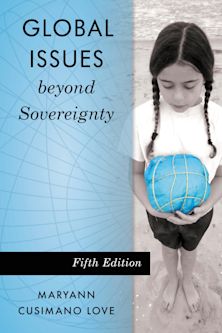- Home
- ACADEMIC
- Politics & International Relations
- Globalization & Global Governance
- Globalization and Belonging
Globalization and Belonging
The Politics of Identity in a Changing World
- Textbook
Globalization and Belonging
The Politics of Identity in a Changing World
- Textbook
- Delivery and returns info
-
Free CA delivery on orders $40 or over
Exam copy added to basket
Choose your preferred format. Please note ebook exam copies are fulfilled by VitalSource™.
You must sign in to add this item to your wishlist. Please sign in or create an account
Description
In the decades since the September 11, 2001, terrorist attacks on the United States forces of cultural, economic, and political integration appear locked in battle with equally powerful forces of fragmentation. Globalization is facilitating unprecedented movement of goods, services, people, and ideas, while calls for building walls, erecting fences, and strengthening borders intensify. Tensions flare around claims of deeply rooted ethnic and civilizational identities—identities that are shaped and mobilized via sophisticated advances in technology. Women worldwide are achieving remarkable economic and political gains while sexual violence and gender inequalities persist and are fueled by rapid global change.
This book explores the complex inter-relationship between globalization and belonging. In a hyper-modern, 21st-century world, questions and conflicts surrounding who ‘we’ are and who ‘we’ want to be predominate. This book links the politics of different forms of identification and attachment to the dynamics of an increasingly interconnected world.
Table of Contents
Chapter 2. Reconfiguring Citizenship
Chapter 3. Making and Re-Making Nations
Chapter 4. Constructed Clashes, Invented Ethnicities
Chapter 5. Gendering Globalization, Globalizing Gender
Chapter 6. Future Belongings
Product details
| Published | Jul 12 2018 |
|---|---|
| Format | Paperback |
| Edition | 2nd |
| Extent | 272 |
| ISBN | 9781538101650 |
| Imprint | Rowman & Littlefield Publishers |
| Dimensions | 231 x 150 mm |
| Series | New Millennium Books in International Studies |
| Publisher | Bloomsbury Publishing |
About the contributors
Reviews
-
Is achieving a sense of personal belonging stymied by the dynamics of globalization?
Before we leap to a simplistic answer, Sheila Croucher makes us pause. She shows us here how to closely observe gendered, ethnicized local and global politics in daily interaction. In this era of refugees, Dreamers, fearmongers, nationalists and human rights activists, we need this thoughtful book.Cynthia Enloe, Author of The Big Push: Exposing and Challenging Persistent Patriarchy
-
Full of contemporary world events exemplary of unprecedented interconnections and violent divisions and exclusions, this latest examination of the relationship between globalization and belonging navigates the paradoxes of simultaneous dilutions and resurgences of identity politics in a globalizing world. It attests to the persistence and reconfigurations of national, racial, ethnic, and gender attachments and inequalities despite and because of globalization in highly engaging, accessible, and complex ways.
Anne Sisson Runyan, University of Cincinnati, University of Cincinnati
-
Globalization’s populist critics fail to appreciate that the horse has left the barn. As Sheila Croucher’s splendid book—at once sophisticated and accessible—makes clear, globalization has transformed and will continue to transform every facet of social life. The author’s focus on its implications for political identities is full of profound insights, as is her analysis of its dark side. Readers will come away with ideas about how we might tame this runaway horse.
Peter Kivisto, Richard A. Swanson Professor of Social Thought, Augustana College
-
At a moment when pundits, politicians and scholars alike proclaim the end of the world as we once knew it, Croucher argues in crisp prose that something more complex and less sensationalist is afoot. Explaining that neither social identity nor class revenge is the primary culprit of rising populism and its discontents, Croucher convincingly demonstrates that new forms of interconnectedness are shaping social identity and class to forge destabilizing shifts such as Brexit, while also consolidating established institutions like the nation-state. A compelling introduction to the deep contradictions of our contemporary moment that includes accessible chapters on both the construction of ethnicity and gender, Globalization and Belonging is a terrific update on its authoritative precursor and will be sure to galvanize debate in the classroom and beyond.
Denise M. Walsh, University of Virginia
-
Dr. Croucher provides the reader with piercing and trenchant insights into the multidimensional facets of the complexities that define our post-modern world. Her first rate contribution fills a significant gap on the study of globalization and the identity politics. This is a must read for students and scholars of globalization alike.
Manochehr Dorraj, professor of international affairs, Texas Christian University
-
Great books stand the test of time. In the fifteen years since the initial publication of Globalization and Belonging, much has changed in the world. Yet Sheila Croucher’s fundamental insight – that people use their identities to reckon with global interconnectedness and, in turn, reconfigure those identities to carve out a sense of belonging in this world – remains a compelling way to understand our world and its puzzling developments. Newcomers and admirers of the first edition alike will be rewarded by the rich and expanded empirical terrain, from Brexit and worldwide debates over immigration and citizenship to the Trump Presidency and a resurgent women’s movement in the United States.
Ryan Saylor, University of Tulsa


































